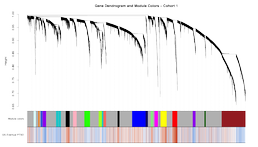Identification of Gene-Modules Associated to a Predisposition of Post-Traumatic Stress Disorder
- Started
- 4th September 2013
- Ended
- 1st February 2014
- Research Team
- Michael Breen
- Investigators
- Christopher Woelk

Shown is the hierarchical clustering dendogram for all 27,000 genes across 96 subjects used in the analysis. Each line is an individual gene clustered based on a dissimilarity measure (1 – TOM). Below the dendogram of each group of genes is given a color
Determining the genetic predisposition to Post-Traumatic Stress Disorder (PTSD) is of great clinical relevance. Currently, 1 out of 8 returning U.S. Veterans are diagnosed with PTSD. In this study we used RNA-Sequencing technology to profile whole-genome gene-expression from a large cohort of U.S. Marines (48 eventual PTSD subjects and 48 controls) sampled prior-to-deployment to the battlefield. Subjects were followed throughout a seven month deployment to obtain disorder related outcomes. We applied a systems-level approach to investigate changes in transcript abundance (gene expression profiles) in whole blood of U.S. Marines.
Our transcriptional study showed changes in the blood associated to early risk of PTSD; 695 genes showed differential expression between pre-trauma PTSD risk and resilience states. Weighted gene co-expression network analysis (WGCNA) was used to find PTSD risk-associated networks (modules of co-expressed genes) and related hub genes (key genes regulating a module). We identified three co-expression modules to be associated to PTSD risk-status. One of these co-expression modules showed a significantly stronger association to PTSD risk while containing a large number of differentially expressed genes. These findings were replicated in a second (24 eventual PTSD subjects and 24 controls) dataset thereby demonstrating a highly significant and consistent association of a large co-expression module with PTSD risk-status. Gene-Ontology analysis of the gene modules implicated functional enrichment gene-categories related to immune response, defense response, innate immunity and inflammatory disease. These PTSD risk-related modules contain several hub genes possibly associated in the early onset and pathology of PTSD for which we confirmed with RT-PCR (a real-time measurement of gene-expression).
With the computational aid of Iridis we were able to run the first large-scale systems-level analysis of blood gene expression of pre-trauma PTSD subjects. We revealed for the first time, a handful of molecular factors and networks associated to the predisposition of PTSD and replicated our findings on a separate cohort. These results have tremendous consequences which may provide new opportunities for early intervention (as within Military recruitment strategies) and new insights into the pathology and molecular mechanisms of this complex disorder. Computationally speaking, this work involves ~27,000 data-points across 126 subjects (27K x 126). In order to perform such an analysis a gene-expression matrix is transformed into a correlation matrix then weighted to guarantee scale-free-topology. Following, various clustering coefficients are applied. Having the ability to run a job utilizing numerous nodes and threads decreases computational time.
Categories
Life sciences simulation: Bioinformatics, Biomedical, Neuroscience, NextGen Sequencing
Programming languages and libraries: Perl, Python, R
Computational platforms: Iridis